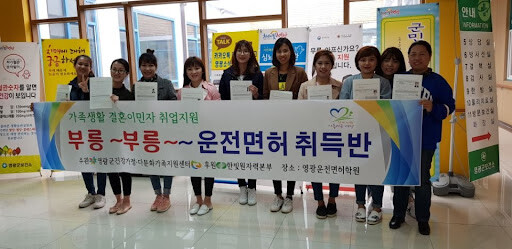
UISEONG, South Korea – The Uiseong Police Station, under the leadership of Superintendent Ahn Yang-soo, has taken proactive steps to enhance road safety and integrate foreign residents into Korean society by offering a specialized driver's license program. On May 15th and May 29th, the Uiseong County Family Support (Multicultural) Center hosted two sessions of a driver's license class, catering to 14 foreign nationals who have resided in Korea for over a year or are planning extended stays.
This initiative addresses a critical need within the foreign community, aiming to curb unlicensed driving and prevent traffic-related offenses. By facilitating access to driver's licenses, the Uiseong Police are actively contributing to the establishment of a robust and responsible traffic culture among all residents, including those who may face language or cultural barriers. The program underscores the police force's commitment to community engagement and crime prevention through education and support rather than solely enforcement.
The police provided comprehensive support to the participating foreign residents, recognizing the unique challenges they might encounter. This included the free distribution of writing materials and, crucially, customized textbooks tailored for those unfamiliar with the Korean language. The curriculum focused on problem-solving strategies for the written examination, ensuring that participants were thoroughly prepared for the theoretical aspects of obtaining a driver's license. Such targeted assistance is vital, as the complexity of traffic laws and the language barrier can often deter foreign nationals from attempting the license acquisition process independently. By offering these resources, the program significantly lowers the entry barrier for those seeking to become legal and safe drivers.
Superintendent Ahn Yang-soo emphasized the importance of adhering to traffic regulations during the sessions. He urged participants to consistently wear seatbelts and helmets, and strictly refrain from drunk driving and jaywalking. These fundamental rules of the road are critical for ensuring the safety of drivers, passengers, and pedestrians alike. Superintendent Ahn also affirmed the police station's ongoing commitment to supporting multicultural families and foreign residents in their pursuit of driver's licenses. He stated that the Uiseong Police would continue to actively assist individuals who wish to acquire a driver's license in the future, signaling a long-term commitment to this community-focused initiative.
The Uiseong Police Station's program is part of a broader national effort in South Korea to assist foreign residents with integration and provide essential services. Many police departments across the country, often in collaboration with multicultural family support centers, offer similar initiatives. These programs typically cover various aspects of the driver's license test, including traffic laws, road signs, and safe driving practices. They often provide study materials in multiple languages, such as English, Chinese, Vietnamese, and Tagalog, to accommodate the diverse linguistic backgrounds of foreign residents. Some centers even offer mock tests and practical driving lessons to further enhance the chances of success for participants.
The impact of such programs extends beyond merely issuing licenses. They play a significant role in empowering foreign residents, enabling them to navigate daily life with greater independence and ease. Access to a driver's license can open up employment opportunities, facilitate commutes, and improve overall quality of life, particularly in areas with limited public transportation. Furthermore, by educating foreign residents about local traffic laws and fostering a culture of compliance, these initiatives contribute to a safer environment for everyone on the road. Reducing instances of unlicensed driving not only decreases traffic accidents but also minimizes potential legal complications for foreign nationals, allowing them to lead more stable lives in Korea.
The Uiseong Police's proactive stance exemplifies a modern approach to community policing, one that prioritizes prevention and education. By reaching out to the foreign community and addressing their specific needs, the police are building trust and fostering positive relationships. This collaborative model, where law enforcement works hand-in-hand with community organizations like the multicultural family support center, serves as a benchmark for effective social integration programs. It demonstrates that by offering practical assistance and guidance, authorities can significantly improve public safety and contribute to a more harmonious multicultural society. The success of the Uiseong program serves as a testament to the benefits of such inclusive policies, paving the way for similar initiatives nationwide.
[Copyright (c) Global Economic Times. All Rights Reserved.]






























